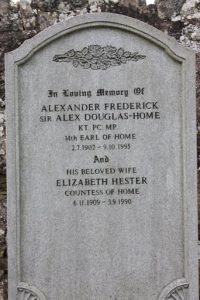East – Row 1 – 30 – Douglas-Home
Transcription
In loving memory of ALEXANDER FREDERICK Sir ALEX DOUGLAS-HOME KT PC MP 14th Earl of Home 2nd July 1902 – 9th October 1985. And his beloved wife ELIZABETH HESTER Countess Home 6th November 1909 – 3rd September 1990.
Commentary
Taken from Wikipedia,
Alexander Frederick Douglas-Home, Baron Home of the Hirsel, KT, PC (/ˈhjuːm/ (![]() listen); 2 July 1903 – 9 October 1995) was a British Conservative politician who served as Prime Minister of the United Kingdom from October 1963 to October 1964. He was the last Prime Minister to hold office while a member of the House of Lords, before renouncing his peerage and taking up a seat in the House of Commons for the remainder of his premiership. His reputation, however, rests more on his two spells as Britain’s foreign minister than on his brief premiership.
listen); 2 July 1903 – 9 October 1995) was a British Conservative politician who served as Prime Minister of the United Kingdom from October 1963 to October 1964. He was the last Prime Minister to hold office while a member of the House of Lords, before renouncing his peerage and taking up a seat in the House of Commons for the remainder of his premiership. His reputation, however, rests more on his two spells as Britain’s foreign minister than on his brief premiership.
The eldest child of Charles Douglas-Home, Lord Dunglass, he was educated at Ludgrove School, Eton College and Christ Church, Oxford. A talented cricketer, he played first-class cricket at club and county level; he began serving in the Territorial Army from 1924. Douglas-Home (under the courtesy title Lord Dunglass) entered Parliament in 1931 and served as Neville Chamberlain‘s parliamentary aide, although his diagnosis in 1940 with spinal tuberculosis would immobilise him for two years. Having recovered enough to resume his political career, Douglas-Home lost his seat in the 1945 general election. He regained it in 1950, but left the Commons the following year when, on the death of his father, he entered the Lords as the 14th Earl of Home. Under the next Conservative government, Home was appointed to increasingly senior posts, such as Leader of the House of Lords and Foreign Secretary. In the latter post (1960–1963) he supported United States resolve in the Cuban Missile Crisis and was the UK signatory of the Partial Nuclear Test Ban Treaty in August 1963.
In October 1963, Harold Macmillan resigned as Prime Minister and Home was chosen to succeed him. By the 1960s, it was unacceptable for a Prime Minister to sit in the Lords, so Home renounced his peerage and successfully stood for election to Parliament as Sir Alec Douglas-Home. The manner of his appointment was controversial, and two Macmillan Cabinet ministers refused to stay in office under him. Criticised by the Labour Party as an out-of-touch aristocrat, he came over stiffly in television interviews, by contrast with Labour leader Harold Wilson. As Prime Minister, Douglas-Home’s demeanour and appearance remained aristocratic and old-fashioned. His understanding of economics was primitive, and he gave his Chancellor, Reginald Maudling, free rein to handle financial affairs. He enjoyed dealing with foreign policy and his Foreign Secretary, Rab Butler, was not especially energetic, but there were no major crises or issues to resolve.[n 1] The Conservative Party, having governed for nearly twelve years, lost their standing after the scandalous Profumo affair under Macmillan and, by Douglas-Home’s premiership, seemed headed for heavy electoral defeat; his premiership was the second briefest of the 20th century, lasting two days short of a year. Among the legislation passed under his government was the abolition of resale price maintenance in 1964.
Narrowly defeated in the 1964 election, Douglas-Home resigned the party leadership in July 1965, having instituted a new and less secretive method for electing the leader. He later served in the cabinet of Prime Minister Edward Heath at the Foreign and Commonwealth Office (1970–1974), an expanded version of his former secretaryship. After the first of the twin Conservative defeats of 1974, he stood down at the second, the October 1974 election, and returned to the Lords as a life peer titled Lord Home of the Hirsel. He gradually retired from front-line politics and died in 1995, aged 92.


